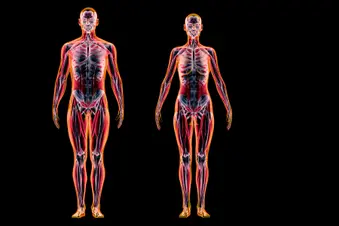
Hereditary transthyretin amyloidosis (hATTR) can cause serious, even debilitating symptoms in a number of your body’s organs and systems. It’s caused by a gene mutation, or change, that’s passed down through families.
The mutation affects the way your body makes the protein transthyretin (TTR). The TTR protein molecules form into the wrong shape. That causes them to clump together into a substance called amyloid. Deposits of amyloid build up in your organs and other tissues, causing problems over time.
The parts of your body most often affected are your nerves, heart, digestive system, kidneys, and eyes.
hATTR and Your Nervous System
Most people with hATTR have damage to their peripheral nerves, called polyneuropathy.
These nerves are found all over your body, in places other than your brain and spinal cord. Your peripheral nervous system has two main parts:
Somatic nervous system. These nerves send sense signals like touch, heat, and pain to your brain. They also help you move your muscles.
Autonomic nervous system. These nerves control basic body functions you do without thinking, like breathing and digestion.
Amyloid deposits cause your nerve fibers to break down. It usually starts with the smallest nerve fibers, which have the least protection. In your somatic nervous system, they’re responsible for pain and how your body feels temperature.
Symptoms usually begin in your feet and hands and travel up your limbs. They can include:
- Pain
- Tingling
- Burning
- Being more sensitive to pain and touch
- Being less sensitive to heat
As it progresses, hATTR damage moves to larger nerve fibers that sense vibration and the position of your joints, and control your muscle movements. That can cause:
- Numbness
- Muscle weakness
- Restless legs syndrome
- Loss of coordination
- Loss of balance
- Trouble walking
When nerves in your autonomic nervous system get damaged, you can have symptoms such as:
- Dizziness when you stand
- Irregular heartbeats
- Sexual problems
- A lot of sweating
- Diarrhea, constipation, or both
- Trouble peeing
- Dry mouth
hATTR can also cause nerve problems by making tissues swell that then press on nerves. One of the first symptoms many people with hATTR have is carpal tunnel syndrome. It comes from compression of the nerves that run through your wrists to your hands.
You may feel pain, tingling, and numbness in your fingers, hands, and wrists. You may have a weak grip and drop things. At first, it may come and go, but you’ll eventually feel it all the time.
hATTR and Your Cardiovascular System
Amyloid deposits are made up of long, stiff strands of tangled-up proteins called fibrils. When these build up in your heart muscle tissue, it becomes hard and thick, a condition called cardiomyopathy.
The damage usually starts in your left ventricle, the chamber of your heart that sends oxygen-rich blood out to the rest of your body. The damage caused by hATTR makes your heart pump less effectively. It can also lead to an irregular heart rhythm, coronary artery disease, and even heart failure.
You may have symptoms like:
- Shortness of breath
- Chest pain
- Fatigue
- Insomnia
- Dizziness
- Nausea
- Unintentional weight loss
- Swelling in your legs
Damage to your autonomic nervous system can also affect your cardiovascular system. Autonomic nerves help control your blood pressure. You may have a sudden drop in blood pressure when you sit up in bed or stand up from a sitting position. That’s called orthostatic hypotension, and it can make you dizzy or even faint and fall.
hATTR and Your Digestive System
Your digestive system can be affected in two ways. Damage to your autonomic nervous system affects how the muscles in your stomach and intestines work. Amyloid buildup can also directly damage the tissues in your digestive tract and in other organs that play a role in digestion, including your liver, pancreas, and gallbladder.
It’s common to have:
- Trouble swallowing
- Reflux
- Belly pain
- A feeling of fullness after eating a small amount
- Nausea
- Vomiting
- Diarrhea
- Constipation
- Alternating diarrhea and constipation
- Weight loss
hATTR and Your Urinary System
Amyloid deposits can clog the filtering system in your kidneys that takes waste out of your bloodstream. That can lead to nephrotic syndrome, when your kidneys remove more protein from your body than they should. Symptoms include swelling in your lower legs, belly, arms, and lungs. You may also have weight gain, fatigue, loss of appetite, and foamy urine.
Eventually, your kidneys can’t clean your blood well and may fail, meaning you’ll have to have your blood filtered through a machine (dialysis).
Autonomic nerves control your bladder. Damage there can make you incontinent (not able to hold your pee) or make it hard for you to fully empty your bladder when you pee. Retaining urine can lead to urinary tract infections.
hATTR and Your Eyes
It’s less common, but some variations of hATTR can affect your eyes. Amyloid deposits inside your eyes can create spots in your vision (floaters) or cloudiness in the clear gel inside your eyeball.
You might also have:
- Dry eyes
- Misshapen pupils
- Glaucoma (increased pressure in your eyeballs)
- Problems with the blood vessels in your eyes
Over time, these can cause vision problems, and you could even lose your vision.
Show Sources
Photo Credit: LEONELLO CALVETTI/Science Source
SOURCES:
Amyloid Research Consortium: “Disease Overview: Hereditary Transthyretin Amyloidosis,” “Neuropathy in Amyloidosis: Symptoms and Management,” “Gastrointestinal Involvement in Amyloidosis: Symptoms And Management.”
Neurology and Therapy: “A Narrative Review of the Role of Transthyretin in Health and Disease.”
Cleveland Clinic: “Nervous System.”
Mount Sinai Journal of Medicine: “Amyloid Neuropathies.”
Amyloidosis Foundation: “Hereditary Amyloidosis.”
StatPearls: “Transthyretin Amyloid Cardiomyopathy (ATTR-CM).”
Mayo Clinic: “Nephrotic Syndrome.”
Therapeutics and Clinical Risk Management: “Diagnosis and Treatment of Hereditary Transthyretin Amyloidosis (hATTR) Polyneuropathy: Current Perspectives on Improving Patient Care.”
American Academy of Ophthalmology: “Vitreous Opacities.”